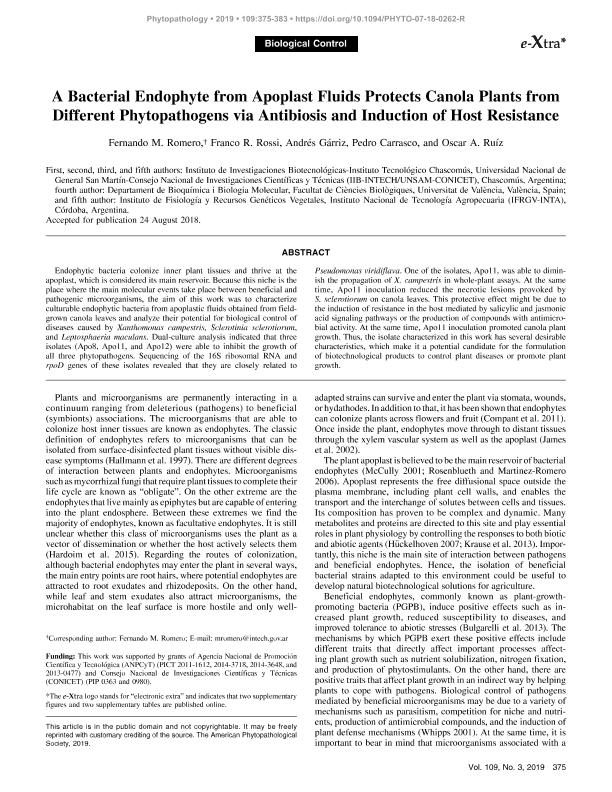Artículo
A bacterial endophyte from apoplast fluids protects canola plants from different phytopathogens via antibiosis and induction of host resistance
Romero, Fernando Matias ; Rossi, Franco Rubén
; Rossi, Franco Rubén ; Gárriz, Andrés
; Gárriz, Andrés ; Carrasco, Pedro; Ruiz, Oscar Adolfo
; Carrasco, Pedro; Ruiz, Oscar Adolfo
 ; Rossi, Franco Rubén
; Rossi, Franco Rubén ; Gárriz, Andrés
; Gárriz, Andrés ; Carrasco, Pedro; Ruiz, Oscar Adolfo
; Carrasco, Pedro; Ruiz, Oscar Adolfo
Fecha de publicación:
03/2019
Editorial:
American Phytopathological Society
Revista:
Phytopathology
ISSN:
0031-949X
e-ISSN:
1943-7684
Idioma:
Inglés
Tipo de recurso:
Artículo publicado
Clasificación temática:
Resumen
Endophytic bacteria colonize inner plant tissues and thrive at the apoplast, which is considered its main reservoir. Because this niche is the place where the main molecular events take place between beneficial and pathogenic microorganisms, the aim of this work was to characterize culturable endophytic bacteria from apoplastic fluids obtained from field-grown canola leaves and analyze their potential for biological control of diseases caused by Xanthomonas campestris, Sclerotinia sclerotiorum, and Leptosphaeria maculans. Dual-culture analysis indicated that three isolates (Apo8, Apo11, and Apo12) were able to inhibit the growth of all three phytopathogens. Sequencing of the 16S ribosomal RNA and rpoD genes of these isolates revealed that they are closely related to Pseudomonas viridiflava. One of the isolates, Apo11, was able to diminish the propagation of X. campestris in whole-plant assays. At the same time, Apo11 inoculation reduced the necrotic lesions provoked by S. sclerotiorum on canola leaves. This protective effect might be due to the induction of resistance in the host mediated by salicylic and jasmonic acid signaling pathways or the production of compounds with antimicrobial activity. At the same time, Apo11 inoculation promoted canola plant growth. Thus, the isolate characterized in this work has several desirable characteristics, which make it a potential candidate for the formulation of biotechnological products to control plant diseases or promote plant growth.
Palabras clave:
ENDOPHYTES
,
CANOLA
,
APOPLAST
,
BIOLOGICAL CONTROL
Archivos asociados
Licencia
Identificadores
Colecciones
Articulos(CCT - LA PLATA)
Articulos de CTRO.CIENTIFICO TECNOL.CONICET - LA PLATA
Articulos de CTRO.CIENTIFICO TECNOL.CONICET - LA PLATA
Articulos(IIB-INTECH)
Articulos de INST.DE INVEST.BIOTECNOLOGICAS - INSTITUTO TECNOLOGICO CHASCOMUS
Articulos de INST.DE INVEST.BIOTECNOLOGICAS - INSTITUTO TECNOLOGICO CHASCOMUS
Citación
Romero, Fernando Matias; Rossi, Franco Rubén; Gárriz, Andrés; Carrasco, Pedro; Ruiz, Oscar Adolfo; A bacterial endophyte from apoplast fluids protects canola plants from different phytopathogens via antibiosis and induction of host resistance; American Phytopathological Society; Phytopathology; 109; 3; 3-2019; 375-383
Compartir
Altmétricas



